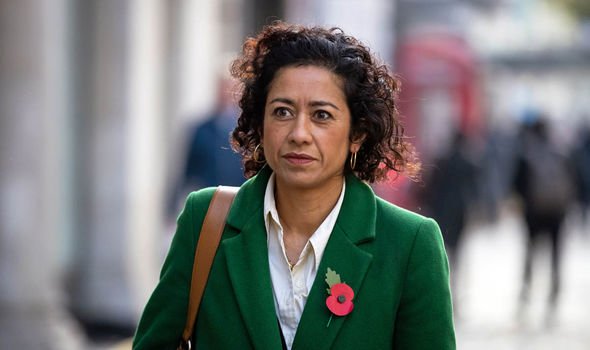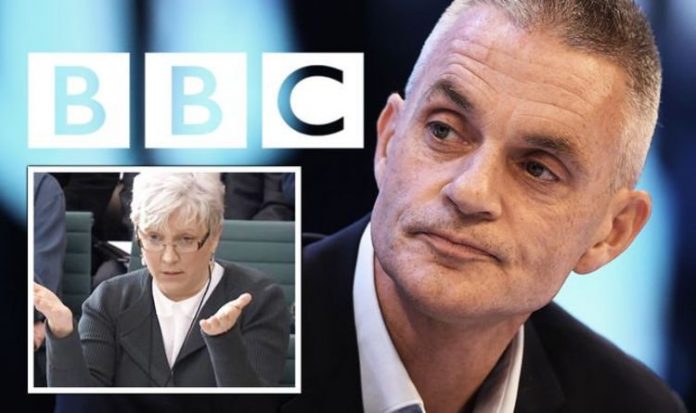The Equality and Human Rights Commission considered pay complaints raised by BBC staff. It said “the processes, if not the outcomes, let women down” and recommended that the BBC put in place improvements to rebuild trust. But it did not find any breaches of the law, despite a torrid few years for the BBC and payouts to female staff. The watchdog published its findings after selecting 10 cases to look at in depth, from 2017 to 2019.
Gracie, who resigned from her position as China editor in 2018 in protest at pay inequalities and was later given an apology and back pay, wrote on Twitter: “Report on BBC equal pay feels like whitewash.
“Examined just 10 cases … Seriously? Follow the ## instead. BBC forced to pay out to hundreds of BBC women.
“Moral of story – don’t rely on regulator but stay strong, calm, united and justice will prevail.”
The report also came after Newswatch presenter Samira Ahmed won a sex discrimination equal pay claim against the broadcaster at a tribunal.
And radio presenter Sarah Montague received a £400,000 settlement and an apology over unequal treatment.
BBC Women, a group of more than 150 broadcasters and producers at the corporation, said they were “deeply disappointed by the findings that do not reflect our experiences”.

Journalist Carrie Gracie says women cannot rely on the regulator for protection (Image: PA•GETTY)
“New cases are coming forward and women are still heading to court. We fight on,” they said.
The investigation was not “robust research”, according to the chief executive of the Fawcett Society.
Sam Smethers said some of the “strongest cases” of pay discrimination were not properly examined by The Equality and Human Rights Commission.
She added: “It just can’t be good, robust research to reach a conclusion like that about systemic discrimination across an organisation but only do 10 in-depth cases, it just doesn’t stand up.”
Smethers labelled the findings as “disappointing”, adding that “the fight for equal pay goes on” at the broadcaster.
Joanna Gregson, head of enforcement at the watchdog, said that despite finding no “pay discrimination” in “the details we looked at … that’s not to say it didn’t happen elsewhere (at the BBC).
“We’ve got the Samira Ahmed case and the BBC has acknowledged there has been some equal pay cases”, she said.

Samira Ahmed won a sex discrimination equal pay claim against the broadcaster (Image: PA)
But the watchdog defended its investigation, saying it was “very confident” in its “robust findings”.
Rebecca Hilsenrath, its chief executive, said women “suffered” at the BBC.
Some “people waited two years for an outcome – there was somebody who was passed between eight different people in 10 months after raising the initial complaint.
“These are real people having a really terrible time,” she said.
They said they “suffered humiliation, anxiety, insomnia, anger, being signed off work.
“If the processes have let you down, then you don’t trust what’s going on. We hope our recommendations will help build a better relationship with the women at the BBC.”

Women reportedly suffered humiliation and anxiety working at the BBC (Image: Getty)
She said there were a number of areas where the BBC was “at risk of unlawful pay discrimination”.
The report found inadequate record-keeping on how decisions about pay were made, leading to confusion and poor communication with women making complaints.
The commission launched an investigation into equal pay at the BBC last year and says its investigation spans from 2017 to 2019.
The corporation’s new director-general, Tim Davie, said the broadcaster accepts the recommendations.
“We note that the commission has made no unlawful findings against the BBC and recognises that there have been significant improvements to BBC pay practices in recent years,” he said.

Tim Davie said the BBC has improved pay practices in recent years (Image: Getty)
“However, we have to work even harder to be best in class. Trust is vitally important and, as an organisation that serves the public, the BBC must continue to lead the way on pay transparency and fairness. We are committed to building a truly inclusive culture.
“We agree with the commission that we should continue to deliver on our reform programme which began in 2015. We accept every one of their recommendations and will implement them.”
Mr Davie recently told MPs that there are 20 gender discrimination cases outstanding at the corporation.
The furore was sparked when the organisation published, in 2017, the salaries of its highest earners.
Latest BBC figures on the broadcaster’s best-paid stars make Zoe Ball the top-earning talent – as Gary Lineker is taking a pay cut.
Fiona Bruce, Vanessa Feltz and Lauren Laverne are also in the top 10.







